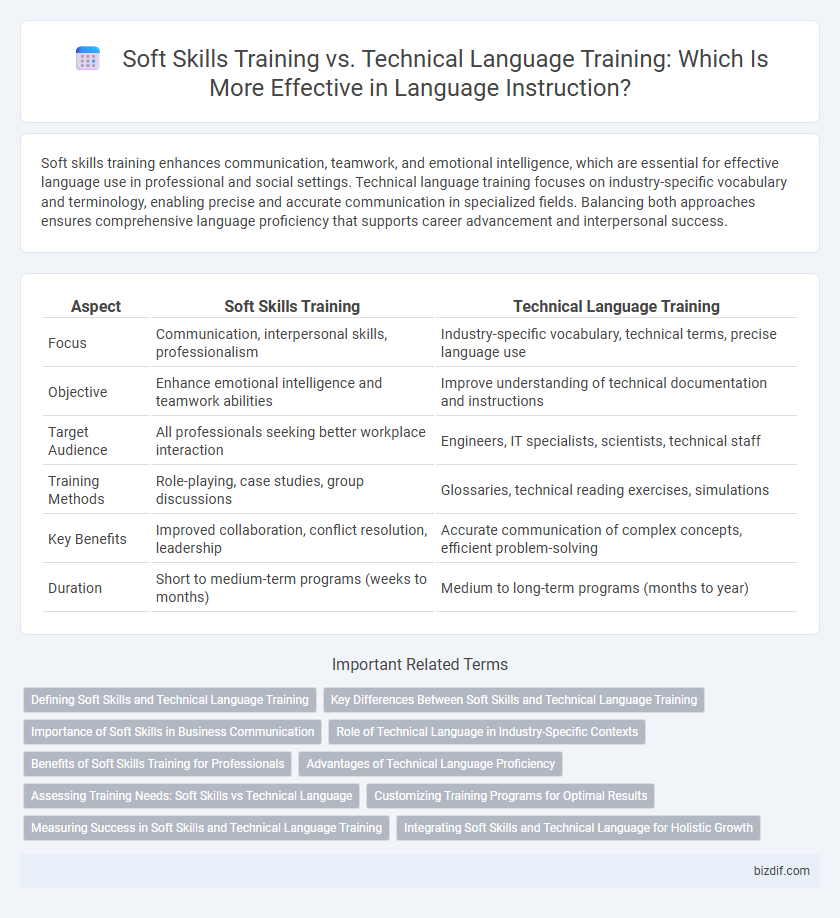Soft skills training enhances communication, teamwork, and emotional intelligence, which are essential for effective language use in professional and social settings. Technical language training focuses on industry-specific vocabulary and terminology, enabling precise and accurate communication in specialized fields. Balancing both approaches ensures comprehensive language proficiency that supports career advancement and interpersonal success.
Table of Comparison
| Aspect | Soft Skills Training | Technical Language Training |
|---|---|---|
| Focus | Communication, interpersonal skills, professionalism | Industry-specific vocabulary, technical terms, precise language use |
| Objective | Enhance emotional intelligence and teamwork abilities | Improve understanding of technical documentation and instructions |
| Target Audience | All professionals seeking better workplace interaction | Engineers, IT specialists, scientists, technical staff |
| Training Methods | Role-playing, case studies, group discussions | Glossaries, technical reading exercises, simulations |
| Key Benefits | Improved collaboration, conflict resolution, leadership | Accurate communication of complex concepts, efficient problem-solving |
| Duration | Short to medium-term programs (weeks to months) | Medium to long-term programs (months to year) |
Defining Soft Skills and Technical Language Training
Soft skills training focuses on developing interpersonal abilities such as communication, teamwork, and problem-solving that enhance workplace interactions and adaptability. Technical language training emphasizes mastering industry-specific vocabulary, jargon, and terminology required for effective professional communication within specialized fields. Both training types address distinct aspects of communication: soft skills enhance relational competence, while technical language training builds precise, context-driven language proficiency.
Key Differences Between Soft Skills and Technical Language Training
Soft Skills Training emphasizes communication, teamwork, problem-solving, and emotional intelligence, fostering interpersonal effectiveness and workplace adaptability. Technical Language Training focuses on specific industry-related terminology, syntax, and professional jargon essential for precise communication within specialized fields. The key difference lies in Soft Skills enhancing relational competencies while Technical Language Training builds domain-specific linguistic proficiency.
Importance of Soft Skills in Business Communication
Soft skills training enhances business communication by improving interpersonal abilities, emotional intelligence, and conflict resolution, which are crucial for effective teamwork and leadership. Unlike technical language training, which focuses on industry-specific terminology, soft skills develop the ability to convey ideas clearly, adapt to diverse audiences, and build professional relationships. Mastery of soft skills directly drives productivity and organizational success by fostering collaboration and trust in the workplace.
Role of Technical Language in Industry-Specific Contexts
Technical language training is crucial for mastering industry-specific terminology, enabling precise communication and reducing errors in professional settings. It bridges the gap between general language proficiency and specialized knowledge, supporting roles in fields like engineering, medicine, and IT. Mastery of technical language enhances collaboration, compliance, and operational efficiency within target industries.
Benefits of Soft Skills Training for Professionals
Soft skills training enhances communication, teamwork, and problem-solving abilities, crucial for professional success and leadership development. It fosters emotional intelligence and adaptability, enabling individuals to navigate workplace dynamics effectively. Improving these interpersonal skills often leads to increased productivity, better client relationships, and career advancement opportunities.
Advantages of Technical Language Proficiency
Technical language proficiency enhances precise communication in specialized fields, reducing misunderstandings and increasing efficiency. Mastery of industry-specific terminology supports clearer collaboration among experts, facilitating problem-solving and innovation. This expertise also boosts credibility and career advancement opportunities within technical professions.
Assessing Training Needs: Soft Skills vs Technical Language
Assessing training needs for soft skills involves evaluating interpersonal communication, emotional intelligence, and teamwork abilities crucial for workplace collaboration. In contrast, technical language training focuses on identifying proficiency gaps in industry-specific terminology, syntax, and context relevant to specialized fields such as IT, engineering, or finance. Effective needs assessment combines qualitative feedback and quantitative data to tailor language instruction that enhances both communicative competence and domain-specific expertise.
Customizing Training Programs for Optimal Results
Customizing training programs by integrating both soft skills training and technical language training enhances learner engagement and practical application. Tailoring content to industry-specific terminology while fostering communication, teamwork, and problem-solving skills ensures comprehensive language proficiency. Data-driven assessments help identify individual needs, enabling precise adjustments that maximize retention and workplace performance.
Measuring Success in Soft Skills and Technical Language Training
Measuring success in soft skills training involves evaluating improvements in communication, teamwork, and problem-solving abilities through behavioral assessments and feedback surveys. Technical language training success is quantified by accuracy, fluency, and comprehension in industry-specific terminology, often assessed via proficiency tests and practical application scenarios. Combining qualitative feedback with quantitative metrics ensures a comprehensive evaluation of both skill types in language instruction programs.
Integrating Soft Skills and Technical Language for Holistic Growth
Integrating soft skills training with technical language instruction fosters holistic employee development by enhancing communication, problem-solving, and teamwork within specialized domains. Emphasizing context-driven language use alongside interpersonal skills ensures professionals can effectively convey complex technical concepts while adapting to diverse workplace scenarios. This combined approach leads to improved collaboration, higher productivity, and stronger client relations across industries.
Soft Skills Training vs Technical Language Training Infographic

 bizdif.com
bizdif.com